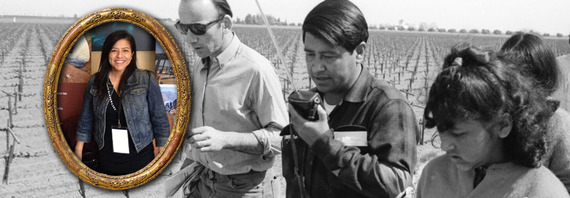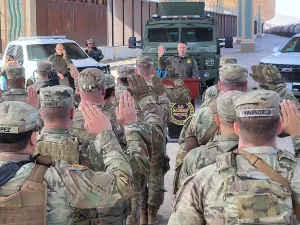-and-
Iconic labor leader, civil rights activist, and Presidential Medal of Freedom awardee Cesar Chavez (1927-1993) created tremendous positive change for farmworkers in the United States.
Source: USDA Farmers.gov
By Suzanne Pender, U.S. Department of Agriculture
Oct 09, 2024
Iconic labor leader, civil rights activist, and Presidential Medal of Freedom awardee Cesar Chavez (1927-1993) created tremendous positive change for farmworkers in the United States. He cofounded United Farm Workers (UFW) in 1967, and used non-violent actions – hunger strikes, pickets, and boycotts – to improve the lives and rights of agricultural workers by winning pay increases, the rights to form unions, bargain collectively and more.

Today, his granddaughter, Christine Chavez, continues his legacy of equity in the agricultural sector through her work as an Outreach Specialist at USDA’s Natural Resources Conservation Service (NRCS). On the occasion of Hispanic Heritage Month, we sat down with Christine to discuss her grandfather’s legacy and how her work is inspired by the groundwork he laid.
Can you share your memories of your grandfather, Cesar Chavez?
I remember my grandfather as a hard worker and most comfortable when he was around farmworkers. At home, he was always in his office, attending meetings or on the telephone.
My mom and dad raised us near Salinas, California. When my grandfather visited, he would somehow find time to meet local leaders or farmworkers who lived in our area. He’d also take my sister Teresa and me to rallies, marches and meetings with workers. This was always fun for me and my cousins.
In my family we say, ‘we don’t have family picnics instead we have family pickets.’
He often told us it was our responsibility to remind people what farmworkers endure and sacrifice to feed people. He said, “The American people are good people, and if you show them, they will respond.”

What do you see as your grandfather’s legacy?
My grandfather’s greatest legacy is that the union he helped co-found is still active today. The UFW continues to fight for the immigrant community and farmworker families. My grandfather would be proud that the movement he built is still going strong and giving farmworkers and the larger Latino community a voice.
Also, he was a huge believer in the power of coalitions because when students, African Americans, members of the Jewish community, labor unions, the LGBT community, Asian American and others come together, their collective voices help the cause of farmworkers too.

How does your work at NRCS continue your grandfather’s work?
Under the leadership of NRCS State Conservationist Carlos Suarez, I, and the rest of our team, have been on the forefront of making programs accessible to all. So many wonderful partners –National Center for Appropriate Technology, CA Dept of Food and Ag, American Farmland Trust, West Fresno Resource Center – work alongside us to reach undeserved communities. I serve as our Limited English Proficiency Coordinator and ensure no one is turned away because of a language barrier.
Also, the Latino Farmer Conference, taking place in Monterey, CA, Nov. 19-20, 2024, is celebrating its tenth year. Carlos asked us to put together a conference, in Spanish, to bring Latino Farmers together to network in their own language and to introduce them to USDA.

What do you think your grandfather would think about the work you do at USDA?
My grandfather would be proud I’m working in agriculture because he understood that farmworkers would eventually become farmers. The current generation of Latino Farmers that USDA serves were farmworkers not that long ago.
He would be pleasantly surprised that Secretary Tom Vilsack became the first USDA Secretary to give farmworkers a seat at the table. Secretary Vilsack asked former UFW President, Arturo Rodriguez, to co-chair the USDA Equity Commission. He also implemented the Farm and Food Workers Relief Grant Program provided $670 million in one-time $600 relief payments to workers impacted by the Covid-19 pandemic. Secretary Vilsack created a $65 million Farm Labor Stabilization and Protection Pilot Program to improve working conditions for all farmworkers, increase pathways for workers from North Central America to strengthen the labor pool in agriculture. Secretary Vilsack is the most pro-farmworker Secretary in the history of USDA and is showing that USDA supports farmers and farmworkers alike.





